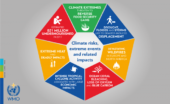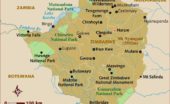Molly Minturn - My family is heartbroken to share that my father died in surgery on Monday, Feb. 10. It…
Climate Change Stories
Written by Diana Thebaud Nicholson // December 14, 2009 // Americas, Carbon, China, Climate Change, Europe & EU, India, Natural Disasters, Public Policy, U.S., Water // Comments Off on Climate Change Stories
See all Climate Change posts
In Bolivia, Water and Ice Tell of Climate Change
If the water problems are not solved, El Alto, a poor sister city of La Paz, could perhaps be the first large urban casualty of climate change. A World Bank report concluded last year that climate change would eliminate many glaciers in the Andes within 20 years, threatening the existence of nearly 100 million people.

2 July
Climate change is shrinking sheep
(BBC) Climate change is causing a breed of wild sheep in Scotland to shrink, according to research.
Scientists say milder winters help smaller sheep to survive, resulting in this “paradoxical decrease in size”. Classic evolutionary theory would predict that wild sheep gradually get bigger, as the stronger, larger animals survive into adulthood and reproduce.
Reporting in Science journal, the team says this shows the “subtle interplay” between evolution and the environment.
Scientists first began studying Soay sheep, on the island of Hirta in the St Kilda archipelago, in 1985. Since then, the sheep have decreased in size by 5% – their legs getting steadily shorter and their body weight decreasing.
14 Feb 2009
Yes, They Could. So They Did.
In New Delhi, it was refreshing to meet idealistic young people who are not waiting for governments to act, but are starting their own projects and driving innovation.
August 13, 2008
Elephant seals join fight against climate change
SYDNEY (Reuters) – Elephant seals swimming under Antarctic ice and fitted with special sensors are providing scientists with crucial data on ice formation, ocean currents and climate change, a study released on Tuesday said.
The seals swimming under winter sea ice have overcome a “blind-spot” for scientists by allowing them to calculate how fast sea ice forms during winter.
June 9
Vague Japan Climate Plan Could Risk its G8 Ambitions
(Planet Ark/Reuters) TOKYO – A Japanese climate policy plan to be issued next week is likely to set a 2050 target to cut greenhouse gas pollution but it also needs a mid-term emissions goal for Japan to gain credibility at next month’s G8 summit, experts say.
Japan is hosting the summit of rich nations to seal an agreement for the world to halve emissions by 2050, a target that the G8 said they would seriously consider at their summit last year in Germany.
But at a time when developing nations are calling for advanced countries to first commit to ambitious targets over a shorter time period, climate experts say Japan might lack bold policies at home to push international negotiations forward.
(RCI) Energy ministers from the Group of Eight countries, including Canada, were joined by China, India and South Korea at a meeting on Sunday to find a solution to rising energy prices. They agreed to deal with the crisis by increasing efficiency and accelerating investment in new technologies, while urging producers to expand production. All agreed that producers and consumers would benefit from greater market stability. The ministers also discussed ways that they can diversity their energy sources to control rising demand for oil and reduce emissions of greenhouse gases blamed for global warming.
June 6
(The Economist) China and India are increasingly keen to show how they are tackling climate change
IF AMERICA at last gets a president who is committed to cutting carbon emissions, then two big Asian countries, China and India, will be seen by many as the source of the world’s biggest climate-change problems. Russia’s economy is more profligate with energy, but China is widely believed to be the world’s biggest emitter of carbon dioxide, and India is rapidly moving up. Gradually China, in particular, is making a show of action to tackle the problem, not least by admitting the scale of emissions it produces and by seeking ways to consume energy more efficiently. India’s reaction, so far, has been more lacklustre.
May 25
G8 environment chiefs to set 2050 greenhouse gas target, leave 2020 target for later talks
(AP) KOBE, Japan: Environment chiefs from top industrial countries neared agreement Sunday on cutting greenhouse gas emissions in half by midcentury, but fell short of the more difficult task of setting a midterm goal for 2020, delegates said.
The government ministers from the Group of Eight nations and observer countries held a second day of talks aimed at setting the stage for decisive action against climate change during the G8 summit in northern Japan in July. They were expected to release a joint statement Monday.
The United Nations is leading talks launched in December to complete a new climate change pact by the end of 2009 to succeed the Kyoto Protocol, whose first phase expires in 2012. The talks, however, have slowed due to divisions among industrialized countries, and between developed and developing nations.
Spain’s drought: a glimpse of our future?
Barcelona is in the grip of a climate crisis on a scale never seen before in modern-day Europe. And now this parched city is being forced to import supplies from France
Barcelona is a dry city. It is dry in a way that two days of showers can do nothing to alleviate. The Catalan capital’s weather can change from one day to the next, but its climate, like that of the whole Mediterranean region, is inexorably warming up and drying out. And in the process this most modern of cities is living through a crisis that offers a disturbing glimpse of metropolitan futures everywhere.
Its fountains and beach showers are dry, its ornamental lakes and private swimming pools drained and hosepipes banned. Children are now being taught how to save water as part of their school day. This iconic, avant-garde city is in the grip of the worst drought since records began and is bringing the climate crisis that has blighted cities in Australia and throughout the Third World to Europe. A resource that most Europeans have grown up taking for granted now dominates conversation. Nearly half of Catalans say water is the region’s main problem, more worrying than terrorism, economic slowdown or even the populists’ favourite – immigration.
The political battles now breaking out here could be a foretaste of the water wars that scientists and policymakers have warned us will be commonplace in the coming decades. The emergency water-saving measures Barcelona adopted after winter rains failed for a second year running have not been enough. The city has had to set up a “water bridge” and is shipping in water for the first time in the history of this great maritime city.
Buying water on an epic scale from France has given the controversy an international aspect as French environmentalists question whether such a scarce natural resource should be sold as a commodity to another country.

Climate change ‘will cost Andes US$30 billion’
Climate change could cost Andean countries US$30 billion per year by 2025, according to a study.
The study was commissioned by the Andean Community of Nations and carried out by the Peruvian University of the Pacific, with the support of specialists from Bolivia, Colombia and Ecuador.
The researchers extrapolated data from a range of international studies about the economic impact of natural disasters in the four countries, such as floods and avalanches. They analysed the cost of rebuilding houses and infrastructure, as well as the relocation of the affected population, Amat y Leon told SciDev.Net.
They conclude that investment in scientific research is crucial to evaluate changes in Andean and Amazonian ecosystems — namely their effects on biodiversity, economic and social infrastructure — and the development models of the countries themselves.
The study also highlights the key role in the region played by the Andes, which provides ten per cent of global water sources through to its glaciers. Experts say that the melting of glaciers in central Andes has accelerated over the last 25 years.
The researchers say that the Andean countries provide a clear indication of the impact of climate change worldwide in the future, making it the ideal place to try technologies and scientific methods to prevent, reduce and adapt infrastructure to a range of challenges.
Is it time to dig for victory again to help tackle climate change?
Thrift, recycling, growing your own – these are the habits that helped win the war. And now they could also help us tackle climate change
A lot of hot air
(The Economist) ONE of the most troubling aspects of climate change is the feedback loop. As the world warms, so frozen earth begins to melt, which releases greenhouse gases, which warms the world up further. Something similar seems to be happening with the literature of climate change. As people write books on global warming, so they generate interest in the subject, which increases demand, which leads to the writing of even more books. Both these cycles result in a lot of hot air.



